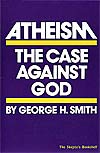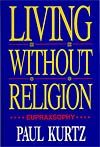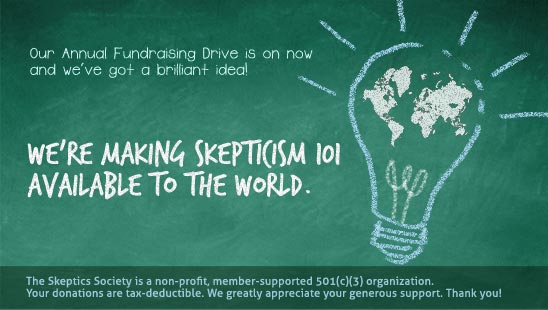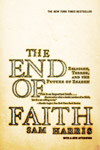In this week’s eSkeptic:
- Junior Detectives Club : Free Skeptics Mix Tape “Bonus Track”
- Lectures at Caltech: Announcing Our Spring 2012 Lectures
- Follow Michael Shermer: God, Guns, and Artificial Intelligence
- Feature article: CHRISTOPHER HITCHENS on:
“Does Science Make Belief in God Obsolete?” - Fundraising Drive on Now: Skepticism 101 available to the world!
Junior Detectives Club —
Free Skeptics Mix Tape “Bonus Track”
TO START 2012 OFF RIGHT, we’re pleased to share a small gift from Junior Skeptic: the upbeat and apt song, “Junior Detectives Club” from science-themed children’s musician Monty Harper. We’ve added “Junior Detectives Club” as a bonus track for the the kid-friendly Skeptics Mix Tape 2009 project.
Harper recorded this song in 2007 for the Collaborative Summer Library Program (a reading program shared by many states) and for his album Get a Clue. “I wanted it to sound like a real club, singing a song to open their meeting,” Harper told eSkeptic. To achieve that sound, he enlisted the help of Oklahoma music teacher Rana McCoy and her children’s voice group, The Center Stage Singers.
The result is a light-hearted skeptical manifesto for kids, performed by kids—and it’s yours to enjoy.
Monty Harper writes award-winning children’s songs about science, reading, and creativity. His audiences laugh, clap, sing, wiggle, shout, roar, giggle, jump, hoot, pop, snap, and most of all… think! To learn more about Monty Harper visit his website, or check out his latest album, Songs From the Science Frontier, on iTunes.
Announcing the Spring 2012 Season
of Our Distinguished Lectures at Caltech
MARK YOUR CALENDAR! The Skeptics Society is pleased to announce another season of our Distinguished Lecture Series at Caltech.
All lectures are in Baxter Lecture Hall on a Sunday at 2 pm with the exception of the Monday, March 19 lecture which will be held at 7:30 pm and the Sunday, March 25 debate which will be held in Beckman Auditorium at 2 pm. All events include an author book signing. First up…
- Why We Believe in God(s): A Concise Guide to the Science of Faith
with Dr. Andy Thomson
Sunday February 12, 2012 at 2 pm - Abundance: Why the Future Will Be Much Better Than You Think
with Dr. Peter Diamandis
Saunday, February 26, 2012 at 2 pm - The Creative Destruction of Medicine: How the Digital Revolution
Will Create Better Health Care
with Dr. Eric Topol
Sunday, March 11, 2012 at 2 pm - Revelations: Visions, Prophecy, & Politics in the Book of Revelation
with Dr. Elaine Pagels
Monday, March 19, 2012 at 7:30 pm - The Great Debate: “Has Science Refuted Religion?”
Sean Carroll & Michael Shermer v. Dinesh D’Souza & Ian Hutchinson
Beckman Auditorium
Sunday, March 25, 2012 at 2 pm - Born Believers: The Science of Children’s Religious Belief
with Dr. Justin Barrett
Sunday, April 15, 2012 at 2 pm - Subliminal: How Your Unconscious Mind Rules Your Behavior
with Dr. Leonard Mlodinow
Sunday, April 29, 2012 at 2 pm - Consciousness: Confessions of a Romantic Reductionist
with Dr. Christof Koch
Sunday, May 13, 2012 at 2 pm - The Secrets of Mental Math: The Mathemagician’s Guide
to Lightning Calculation and Amazing Math Tricks
with Dr. Art Benjamin
Sunday, June 10, 2012 at 2 pm

NEW ON MICHAELSHERMER.COM
In the Year 9595
We have all heard about Watson, the computer that beat the two best champions on Jeopardy. But, how close are we to having computers emulate human though, become self-aware and take over the world? In this, the January Skeptic column for Scientific American, Michael Shermer ponders the question of artificial intelligence.
NEW ON SKEPTICBLOG.ORG
More God Less Crime, or More Guns Less Crime
During the last week of 2011, Michael Shermer spoke at and attended a salon in Santa Fe, New Mexico at which two of the speakers addressed the topic of the decline of crime, one (Byron Johnson) attributing it to god and the other (John Lott) to guns. In this week’s Skepticblog, Michael Shermer reports on their findings…
Christopher Hitchens on:
“Does Science Make Belief in God Obsolete?”
That was the Templeton Foundation’s Big Question in the third of a series of questions posed to leading scientist and scholars, among them: Steven Pinker, Victor Stenger, Mary Midgley, William D. Phillips, Christoph Cardinal Schönborn and Michael Shermer. In this week’s eSkeptic, we present Christopher Hitchens’ answer. Christopher Hitchens is the author of God Is Not Great. Hitchens died on December 15, 2011 at the age of 62. In tribute to Hitchens, we present this article which was edited by Michael Shermer for the Templeton Foundation’s Big Question Series. Tune in next week for a debate between Hitchens and Kenneth Miller (also part of the Big Questions Series).
No, But it Should
by Christopher Hitchens
Does science make belief in god obsolete? No, but it should. Until about 1832, when it first seems to have become established as a noun and a concept, the term “scientist” had no really independent meaning. “Science” meant “knowledge” in much the same way as “physic” meant medicine, and those who conducted experiments or organized field expeditions or managed laboratories were known as “natural philosophers.” To these gentlemen (for they were mainly gentlemen) the belief in a divine presence or inspiration was often merely assumed to be a part of the natural order, in rather the same way as it was assumed—or actually insisted upon—that a teacher at Cambridge University swear an oath to be an ordained Christian minister. For Sir Isaac Newton—an enthusiastic alchemist, a despiser of the doctrine of the Trinity and a fanatical anti-Papist—the main clues to the cosmos were to be found in Scripture. Joseph Priestley, discoverer of oxygen, was a devout Unitarian as well as a believer in the phlogiston theory. Alfred Russel Wallace, to whom we owe much of what we know about biogeography and natural selection, delighted in nothing more than a session of ectoplasmic or spiritual communion with the departed.
And thus it could be argued—though if I were a believer in god I would not myself attempt to argue it—that a commitment to science by no means contradicts a belief in the supernatural. The best known statement of this opinion in our own time comes from the late Stephen Jay Gould, who tactfully proposed that the worlds of science and religion commanded “non-overlapping magisteria.” How true is this on a second look, or even on a first glance? Would we have adopted monotheism in the first place if we had known:
- That our species is at most 200,000 years old, and very nearly joined the 98.9 percent of all other species on our planet by becoming extinct, in Africa, 60,000 years ago, when our numbers seemingly fell below 2,000 before we embarked on our true “exodus” from the savannah?
- That the universe, originally discovered by Edwin Hubble to be expanding away from itself in a flash of red light, is now known to be expanding away from itself even more rapidly, so that soon even the evidence of the original “big bang” will be unobservable?
- That the Andromeda galaxy is on a direct collision course with our own, the ominous but beautiful premonition of which can already be seen with a naked eye in the night sky?
These are very recent examples, post-Darwinian and post-Einsteinian, and they make pathetic nonsense of any idea that our presence on this planet, let alone in this of so many billion galaxies, is part of a plan. Which design, or designer, made so sure that absolutely nothing (see above) will come out of our fragile current “something”? What plan, or planner, determined that millions of humans would die without even a grave-marker, for our first 200,000 years of struggling and desperate existence, and that there would only then at last be a “revelation” to save us, about 3,000 years ago, but disclosed only to gaping peasants in remote and violent and illiterate areas of the Middle East?
To say that there is little “scientific” evidence for the last proposition is to invite a laugh. There is no evidence for it, period. And if by some strenuous and improbable revelation there was to be any evidence, it would only argue that the creator or designer of all things was either (a) very laborious, roundabout, tinkering and incompetent and/or (b) extremely capricious and callous, and even cruel. It will not do to say, in reply to this, that the lord moves in mysterious ways. Those who dare to claim to be his understudies and votaries and interpreters must either accept the cruelty and the chaos or disown it: they cannot pick and choose between the warmly benign and the frigidly indifferent. Nor can the religious claim to be in possession of secret sources of information that are denied to the rest of us. That claim was, once, the prerogative of the Pope and the witch-doctor, but now it’s gone. This is as much as to say that reason and logic reject god, which (without being conclusive) would be a fairly close approach to a scientific rebuttal. It would also be quite near to saying something that lies just outside the scope of this essay, which is that morality shudders at the idea of god, as well.
Religion, remember, is theism not deism. Faith cannot rest itself on the argument that there might or might not be a prime mover. Faith must believe in answered prayers, divinely-ordained morality, heavenly warrant for circumcision, the occurrence of miracles or what you will. Physics and chemistry and biology and palaeontology and archaeology have, at a minimum, given us explanations for what used to be mysterious, and furnished us with hypotheses that are at least as good as, or very much better than, the ones offered by any believers in other and inexplicable dimensions.
Does this mean that the inexplicable or superstitious has become “obsolete”? I myself would wish to say no, if only because I believe that the human capacity for wonder neither will nor should be destroyed or superseded. But the original problem with religion is that it is our first, and our worst, attempt at explanation. It is how we came up with answers before we had any evidence. It belongs to the terrified childhood of our species, before we knew about germs or could account for earthquakes. It belongs to our childhood, too, in the less charming sense of demanding a tyrannical authority: a protective parent who demands compulsory love even as he exacts a tithe of fear. This unalterable and eternal despot is the origin of totalitarianism, and represents the first cringing human attempt to refer all difficult questions to the smoking and forbidding altar of a Big Brother. This of course is why one desires that science and humanism would make faith obsolete, even as one sadly realizes that as long as we remain insecure primates we shall remain very fearful of breaking the chain. ![]()
Skeptical perspective on faith and spirituality…
-
 Atheism: The Case Against God
Atheism: The Case Against God
by George Smith
-
 The Soul of Science
The Soul of Science
by Michael Shermer -
Can we find spiritual meaning and purpose in a scientific worldview? Yes! There are many sources of spirituality; religion may be the most common, but it is by no means the only. Anything that generates a sense of awe may be a source of spirituality. Science does this in spades. READ more and order the book.
-
 Living Without Religion
Living Without Religion
by Paul Kurtz -
One of America’s foremost expositors of humanist philosophy, Paul Kurtz shows how we can live the good life filled with morality, commitment, and dedication, without having to depend on the existence of a higher being. Drawing upon the disciplines of the sciences, philosophy, and ethics, Kurtz also offers concrete recommendations for the development of the humanism of the future. READ more and order the book.

OUR ANNUAL FUNDRAISING DRIVE IS ON NOW
We need your support!
- Click here to read our new plan to take Skepticism to the next level!
- Click here to make a donation now via our online store.
Monthly Recurring Donation Options Now Available
We encourage you to choose the monthly recurring donation option. Simply tell us how long you want your donation to recur (using the drop-down menu on the donation page) and we’ll set up automatic withdrawal for the amount you select.
Just for considering a donation, check out our free PDF download
created by Junior Skeptic Editor Daniel Loxton.













